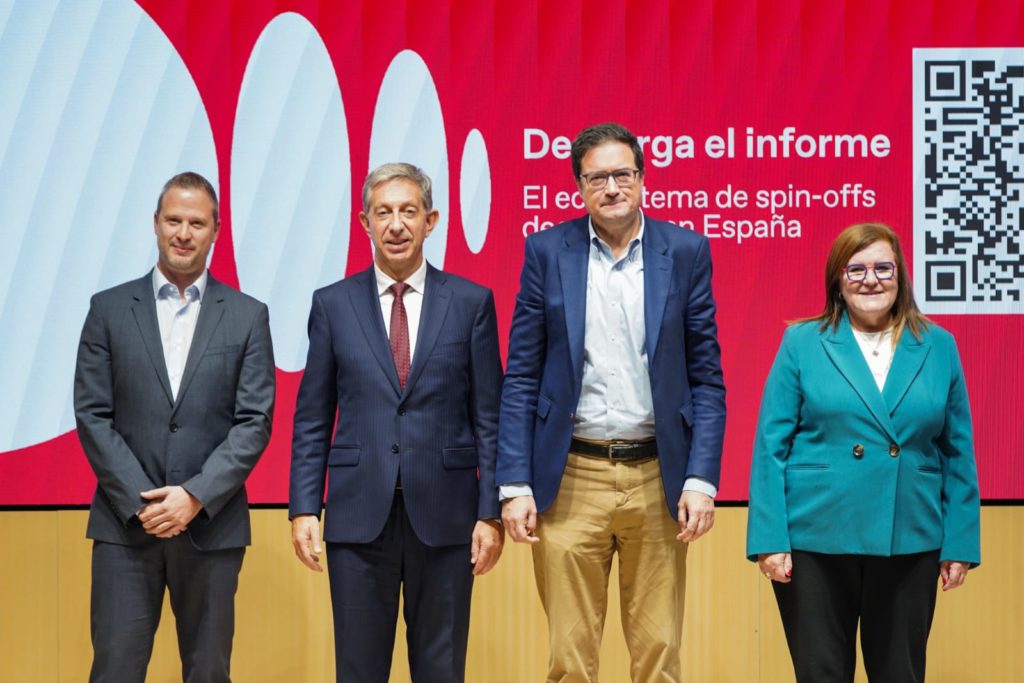- The Mobile World Capital report ‘The Deep Tech Spin-Off Ecosystem in Spain 2025’, presented at the headquarters of the Ministry for Digital Transformation, reveals that the 1,007 deep tech companies created from universities and research centres generate a combined turnover of €1.4 billion
- The main areas of activity for spin-offs are biotechnology (19.8%), ICT (17.4%) and health (16.7%)
- Public universities lead the generation of spin-offs, accounting for 64.1% of all companies originating from their centres

27/October/2025
The ecosystem of technology-based companies emerging from universities and research centres in Spain has grown by 3.6% over the past year, reaching a total of 1,007 active deep tech spin-offs. These are the findings of Mobile World Capital Barcelona’s (MWCapital) report ‘The Deep Tech Spin-Off Ecosystem in Spain 2025’, presented this morning at the headquarters of the Ministry for Digital Transformation.
The report outlines an emerging yet steadily expanding ecosystem, reflecting the growth of the technology transfer model in Spain, which facilitates the transition of research from classrooms and laboratories to the market through company creation. According to the study, Spanish deep tech spin-offs generate an annual turnover of €1.4 billion.
In terms of employment, companies in the energy sector have the largest average workforce (28.1 employees), followed by information technologies (16.5) and Industry 4.0 (14). Overall, the Spanish deep tech spin-off ecosystem provides 13,456 qualified jobs.
The report’s presentation featured the participation of the Minister for Digital Transformation and the Civil Service, Óscar López, who highlighted the Spanish Government’s support for the deep tech spin-off ecosystem. “This report demonstrates that Spain is consolidating its position as an entrepreneurial state in the key stages of innovation. We plant disruptive seeds, nurture their growth and celebrate their finest fruits: technological transfer.” The Minister added: “We are witnessing a new technological era — the springtime of deep tech spin-offs.”
For Francesc Fajula, CEO of MWCapital, “this report provides the first in-depth snapshot of a strategic ecosystem for positioning Spain within the global technology landscape. The creation of companies based on scientific and academic research is the main source of disruptive technological solutions with impact across key sectors such as biotechnology, energy, health and robotics, among many others.”.
Main sectors of spin-offs
In addition to the steady growth of the ecosystem, the report confirms that most Spanish spin-offs are concentrated in three sectors: Biotechnology (19.8%), Information and Communication Technologies – ICT (17.4%) and Health (16.7%).
Geographically, more than half of all Spanish spin-offs are located in Catalonia (28.2%) and Madrid (23.7%), home to the country’s leading universities and research centres. They are followed by Valencian Community (11.1%), Andalusia (9.5%), and the Basque Country (7.4%). Each region exhibits areas of specialisation aligned with its scientific and industrial capabilities: Catalonia stands out in Biotechnology and Health; Madrid excels in Health and ICT; and the Basque Country leads in Energy and Industry 4.0-related projects.
Distribution of spin-offs by sector

Public universities, a driver of deep tech innovation
The study also reveals that over two-thirds of all spin-offs originate in Spanish universities (67%), with public universities being the main incubators (64.1%). They are followed by research centres (18%), technology centres (7%) and health research institutes (8%).
Regarding funding sources, the MWCapital report highlights that more than half of the spin-offs analysed are financed through both public and private funds (61%). Nearly one in three companies rely exclusively on public funding (26%), while 13% depend solely on private investment.
Country missions: innovation addressing major challenges
One of the key innovations in this second edition of the report is the introduction of a new classification based on eight ‘National Missions’, which link spin-off activity to Spain’s major social, economic and environmental challenges. The study finds that more than 70% of spin-offs align with three missions: Healthy and autonomous living (33.8%), Technological sovereignty and democratic digitalisation (27%) and Circular and decarbonised economy (10.9%). They are followed by Sustainable food and resilient bioeconomy (9.1%), Strategic security and resilient defence (6.4%), Climate-neutral cities and smart mobility (4.7%), Social cohesion and quality of life (4.9%) and Restoration of the living planet (3.3%).
The report also introduces the age-adjusted revenue and employment index (IMEA), created especially for this study. This indicator enables the economic performance of spin-offs to be analysed according to their year of creation, offering a more precise view of the ecosystem’s economic traction and helping to identify which missions drive growth. In general, younger spin-offs are the ones most likely to reach profitability, particularly those focused on Circular and Decarbonised Economy, Healthy and Independent Living, and Sustainable Food and Resilient Bioeconomy.
Stay up to date about everything
Subscribe to stay up to date with the latest content from Mobile World Capital Barcelona.
